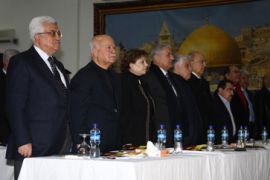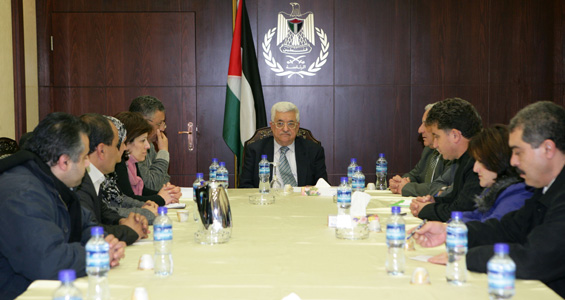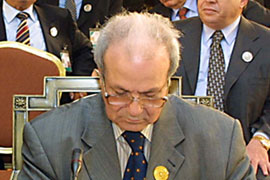Interview: What now for Fatah?
Analyst says the movement must disengage from the PA and return to its political roots.

 |
| The Fatah congress is being convened for the first time in 20 years [GALLO/GETTY] |
Lamis Andoni is an analyst and commentator on Middle East and Palestinian affairs. She has been writing about the Palestine Liberation Organisation (PLO) for the past 20 years and has interviewed all of the key leaders of the movement.
As more than 2,000 delegates gather in the West Bank city of Bethlehem for Fatah’s first congress in 20 years, she says the movement, which has been plagued by infighting and allegations of corruption, is at a critical juncture in its history.
To restore its lost credibility and regain its historical status as the “backbone of the PLO”, she says Fatah must now disengage from the Palestinian Authority (PA) and return to its political roots.
Al Jazeera: What has been Fatah’s historical role within the PLO and the PA and to what extent is this now under threat?
Lamis Andoni: Fatah is the mother of the post-Nakba liberation movement. It was the first movement to effectively challenge Arab governments’ control over Palestinian representation and Israel’s denial of Palestinian national rights.
After its establishment, it soon became the backbone of the PLO, enabling it to evolve from an organisation intended to pacify Palestinian refugees into a real embodiment of Palestinian national rights and eventually the sole legitimate representative of the Palestinian people.
Its strength lay in its ability to open its ranks to all ideologies and political trends. There were Islamists, nationalists, Marxists, liberals, Baathists – in a way Fatah was always a miniature of the PLO.
Yasser Arafat, the late Fatah leader, stood out for his ability to manoeuvre through difficult situations.
He was close to the people in his leadership style but he was also manipulative, authoritarian to an extent and did not do enough to nurture institutions.
| In depth |
|
|
He was simultaneously a unifier and the person responsible for backing splits within the PLO with the aim of maintaining the superiority of Fatah and his leadership.
Under the leadership of Arafat, Fatah walked a tightrope, balancing between its contradictory roles as the main pillar of a Palestinian Authority bound by agreements to contain resistance to the occupation and the role of a defiant movement that had not abandoned its main goal of leading Palestinians into freedom.
Arafat himself personified the soul of Fatah and in broader terms the spirit of the Palestinian struggle.
He became the master of compromise, earning the wrath of many disillusioned Palestinians. But when it came to the ultimate test he refused to sign away Palestinian rights, defying American and Israeli pressure at Camp David in the summer of 2000.
Arafat ultimately paid the price for his defiance, but his act revived Fatah and the Palestinian spirit of resistance, leading to the eruption of the second intifada less than two months after the failed Camp David talks.
Many people, including those who loathed his ruling style and his compromises from Oslo onward, can not but recognise that in spite of his flaws, he was able to maintain a broad sense of unity not only within Fatah but also the PLO and among Palestinians more generally.
His stand at Camp David and later while under siege were the ultimate tests of a man of many attributes and shortcomings who nevertheless died without signing away his people’s rights.
Many have written Fatah off and Fatah is still in danger of killing itself but many people forget that it was Fatah that led and paid the price of the second intifada. It is no surprise that the harshest Israeli clampdown during and after the intifada was reserved for Fatah leaders.
It is a testimony to Fatah’s resilience that despite its merger with the PA and its security apparatus under the terms of the Oslo accords, it joined and even led the second intifada – defying the subordination that the different agreements placed upon the Palestinians.
But at the same time the merger into the PA caused divisions within the movement and aroused suspicions, giving it the appearance of a collaborator.
Compliance with the security apparatus of Israel was seen by some Fatah leaders as necessary to prevent another Israeli invasion of the West Bank and to proceed towards ending the occupation through negotiations.
But Fatah found itself hostage to a process that did not yield any progress toward ending the occupation and which, in effect, consolidated Israeli power and Israel’s hold over Palestinian lives.
Fatah must now decide where to go from here and establish a clear platform to ensure not only its revival but its very survival.
How important is Fatah’s sixth congress and what is its purpose?
This congress is important because Fatah is spread all over the world and how can you keep a movement together without bringing people together?
The congress is the highest authority in Fatah. It is like a parliament. But it has always been difficult to convene in terms of venue and due also to the different turning points in the Palestinian struggle which were always followed by severe splits and differences within the movement.
In a way we are all speculating about the different forces in Fatah and I think this congress could really reveal the inner workings of the party, as well as its strengths and weaknesses.
The establishment of the PA has marginalised Fatah, for even though it became the ruling party in as far as the PA was led by some Fatah members, the movement itself was not included in decision-making.
It felt that it no longer had enough say because the rules had changed with the various agreements which more often than not contradicted Palestinian goals.
What we will see in this congress is that different political views will be aired and new alignments will emerge which could determine the future of Fatah and the Palestinian movement.
If the congress explodes this will not only be fatal to Fatah but it will be a blow to the Palestinian movement in general. It will create a vacuum and, more importantly, will be accompanied by infighting which the Palestinians cannot afford.
This congress will also be influenced by the demands of Fatah prisoners in Israeli jails who will be represented at the conference and some of whom will be running in elections for the Fatah Central Committee.
The issue of the prisoners, along with Arafat’s death and the absence of any inquiry into it, will probably be two major, potentially explosive, issues at the conference.
How have the accusations by Farouk Kaddoumi, a PLO official, that Mahmoud Abbas, the Palestinian president, and Mohammed Dahlan, the former Palestinian security adviser, were complicit in Arafat’s death affected Fatah?
Kaddoumi’s accusations are both an indication of the deep splits within Fatah and a reflection of how the Oslo process has shaken the movement’s nationalist image even within its own rank and file.
Even though Kaddoumi has been a central figure in the history of Fatah and the PLO, his claims were not substantiated by real evidence and their timing affected their credibility.
 |
| Kaddoumi’s claims have heightened divisions with the movement [GALLO/GETTY] |
For one, the document itself is yet to be authenticated and it is difficult for many to understand why there would even be detailed minutes for such a meeting.
This is not to say that the claims do not have a genuine root in the suspicions of many Palestinians, including the rank and file of Fatah, that Arafat was murdered and that there was Palestinian complicity in the implementation of the suspected assassination.
The timing of the accusations, almost five year’s after Arafat’s death, has also raised many questions.
His explanation that he did not come forward publically until he was able to verify the document is not very convincing, since he only made his move after he lost his battle to convene the Fatah congress outside the Occupied Territories.
I saw Kaddoumi last January in Amman and he told me then about the document. I asked him if he had real evidence and he said that he was sure of it.
My conclusion back then was that Kaddoumi was truly convinced that Abbas’ line was dangerous for Fatah and the Palestinian cause and that he genuinely believed somebody from the Fatah leadership was implicated in the death of Arafat.
But belief is different to evidence.
Many in Fatah, including the opponents of Abbas and those who are sympathetic to Kaddoumi, feel that Kaddoumi’s accusations have unwittingly (his detractors would say deliberately) served to further weaken the movement and accelerate its demise.
How can Fatah restore its credibility and remain regionally and internationally relevant?
More so than ever in its history, Fatah is facing a real rival that has popular legitimacy and backing by key regional powers.
Iran and Syria are seeking to further boost their negotiating credentials by supporting Hamas and are ready to accelerate the demise of both Fatah and the PLO.
Egypt, Jordan and other so-called ‘moderate’ countries, the supposed backers of Fatah, are junior partners of Washington in its plans to turn the movement into a huge security apparatus and ensure the Palestinian people’s submission.
More significantly, they could easily switch sides if the US and Israel decide that Hamas is ready to accept the terms of engagement in the ‘peace process’ or that it could be a more effective enforcer of Israeli security.
There is a fear that this congress will foster the prevalence of a political line that accommodates the peace process but what has emerged so far in the draft platform that has been leaked is that Fatah is trying to return to its roots.
It is a platform that seeks to reassert Fatah’s role as a national liberation movement and to rescue its soul.
The fundamental struggle for Fatah at this historic juncture is to restore its identity, unity and the core of its soul.
Its merger into the PA after the signing of the Oslo accords distorted its identity and function.
The one-time backbone of the PLO and embodiment of Palestinian national rights has been reduced to a ruling party largely, but not solely, dependent on proving itself as a ‘peace partner’ in a process that has so far consolidated Israeli occupation and expansionism.
The draft platform commits to all Palestinian rights, including the right of return and rejects the idea of a provisional state which it sees as making the status quo permanent and Israel’s stipulation that it be recognised as a Jewish state.
It also commits to all forms of resistance, including armed struggle, as a legitimate right without advocating armed struggle as the path to achieving Palestinian rights.
It also stipulates that any agreement with Israel be submitted to a referendum and commits to negotiations but not at any price.
What political trends are emerging within Fatah?
The alignments within the movement have been shifting so rapidly that it is difficult to know which are real and which are tactical alliances by different leaders who are seeking election or re-election to the Fatah Central Committee.
There is a clear opposition to the absence of a negotiating strategy and to any deal with Israel that compromises Palestinian rights. This is genuine but we will see a lot of political posturing as this is equivalent to an election season for Fatah.
There is also a generational struggle, but this does not necessarily reflect political differences but rather a struggle for control and position.
The congress representatives are expected to lash out at Abbas’ aides – Fatah and independents alike – who they feel have isolated and marginalised the movement and are monopolising decision makers.
To what extent is Hamas challenging Fatah’s traditional role as the chief representative of the Palestinian people and how has Hamas been able to consolidate its position and popularity as Fatah’s has gone into demise?
Hamas’ legitimacy is derived from its opposition to the Oslo accords, its 2006 election victory and the Israeli siege and war on Gaza. Through these it has gained more nationalist credentials, making it a real rival to Fatah.
As a rival movement it stands to gain from Fatah’s demise but if you consider the broader interests of the Palestinian national movement, Hamas will eventually be weakened if Fatah splinters. It will make it an easier target for Israel and Hamas will realise that it cannot continue the struggle alone.
The tragedy is that they are both engaged in a deadly power struggle supported by regional and international powers that are more interested in making the two parties totally submit rather than in supporting a movement that genuinely seeks Palestinian rights.
Hamas’ refusal to allow Fatah representatives from the Gaza Strip to attend the conference is viewed, even by those within Fatah who support a partnership with Hamas, as an act intended to accelerate the death of Fatah.
This is not to say that the PA can be exonerated for the arrest of Hamas leaders or cadres in the West Bank, regardless of the excuses they give for these arrests.
Both sides are guilty of arresting each other’s members and of human rights violations and both sides have succumbed to a destructive and devastating struggle for authority.
The PA failed to take an appropriate stand when Hamas won the 2006 elections. Instead it emerged as a guarantor of international efforts to subordinate Hamas and make it more compliant. Not only was that a mistake, it also harmed Palestinian national interests.
Palestinian leaders later said, quite correctly, that Hamas was not obliged to recognise Israel. Nevertheless, the damage was done to both sides – the PA lost credibility for repeating the conditions laid down by the Oslo accords which mainly serve the US and Israel and Hamas was left feeling more isolated and targeted.
The only way out now is for Fatah to disengage from the PA and the security stipulations that only serve Israel’s interests and for Hamas to really reach out to those in Fatah who are committed to restoring Fatah’s nationalist identity.
Hamas’ practices in the Gaza Strip, such as restrictions on and harassment of Fatah members, has also damaged their image, so in my view if either of the movements prevail by damaging the other, it is the Palestinians who stand to lose.

